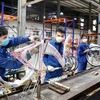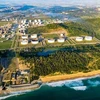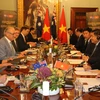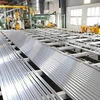Prime Minister Nguyen Tan Dung has approved a scheme to restructure the Electricity of Vietnam (EVN) company over the next three years.
The plan will see EVN focus more on manufacturing and trading electricity, in the hope that this will improve the corporation's competitiveness as well as ensuring there is a sufficient supply of electricity to the economy.
EVN currently operates in four main areas of business. They are: production, distribution and trading of electricity; import and export of electricity; investment and management of power projects; and operation, management, maintenance and upgrading of electrical equipment and power transmission systems.
The scheme will also see EVN rearrange the internal operation of the organisation, improve its governance mechanism and strengthen its authority and responsibility over other enterprises where it has invested capital, and which it thinks fit in with its central aims.
PM Dung has asked the company to ensure that its affiliate companies increase their specialisation and avoid internal competition.
It is expected that after implementing the new measures, the charter capital of EVN will be more than 143.4 trillion VND (6.86 billion USD) following the re-valuation of assets.
EVN is also required to divest capital from six enterprises by the end of 2015, including An Binh Bank, An Binh Securities Co, Global Insurance Joint Stock Co, Sai Gon Vina Real Estate Joint Stock Co, EVN Land Central and the Vietnam Investment and Construction Electricity Company.
In July this year, EVN announced that they wanted to withdraw more than 1.1 trillion VND (52.6 million USD) from affiliates whose operations are not in line with their main business aim. However, they encountered difficulties in negotiating an acceptable selling price.
By the end of last year, EVN invested around 757 billion VND (36.2 million USD) in An Binh Bank, held shares worth 125 billion VND in Global Insurance Co, invested 103 billion VND (5 million USD) in property projects and poured 114.8 billion VND (5.5 million USD) in An Binh Securities Co.-VNA
The plan will see EVN focus more on manufacturing and trading electricity, in the hope that this will improve the corporation's competitiveness as well as ensuring there is a sufficient supply of electricity to the economy.
EVN currently operates in four main areas of business. They are: production, distribution and trading of electricity; import and export of electricity; investment and management of power projects; and operation, management, maintenance and upgrading of electrical equipment and power transmission systems.
The scheme will also see EVN rearrange the internal operation of the organisation, improve its governance mechanism and strengthen its authority and responsibility over other enterprises where it has invested capital, and which it thinks fit in with its central aims.
PM Dung has asked the company to ensure that its affiliate companies increase their specialisation and avoid internal competition.
It is expected that after implementing the new measures, the charter capital of EVN will be more than 143.4 trillion VND (6.86 billion USD) following the re-valuation of assets.
EVN is also required to divest capital from six enterprises by the end of 2015, including An Binh Bank, An Binh Securities Co, Global Insurance Joint Stock Co, Sai Gon Vina Real Estate Joint Stock Co, EVN Land Central and the Vietnam Investment and Construction Electricity Company.
In July this year, EVN announced that they wanted to withdraw more than 1.1 trillion VND (52.6 million USD) from affiliates whose operations are not in line with their main business aim. However, they encountered difficulties in negotiating an acceptable selling price.
By the end of last year, EVN invested around 757 billion VND (36.2 million USD) in An Binh Bank, held shares worth 125 billion VND in Global Insurance Co, invested 103 billion VND (5 million USD) in property projects and poured 114.8 billion VND (5.5 million USD) in An Binh Securities Co.-VNA



















